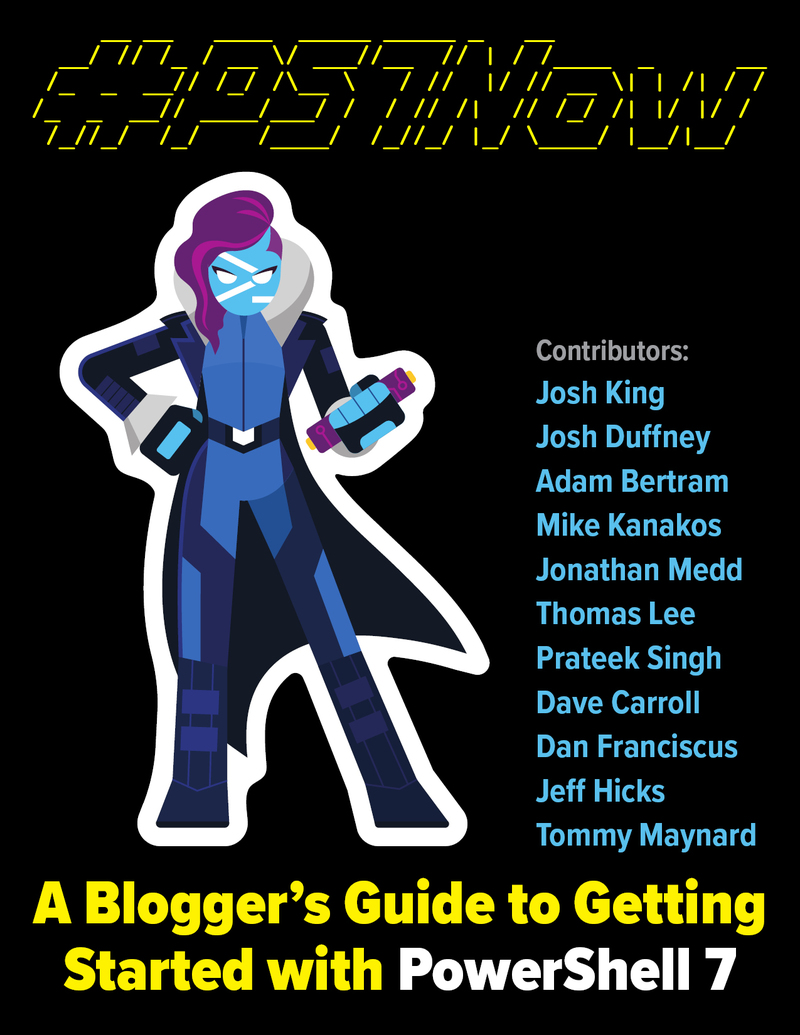I started my career almost 30 years ago at a small Mom-and-Pop computer store building and repairing home computer systems and peripherals. Since then, I've worked in the public and private sectors with 17 years in higher education. Currently, I am a DevOps engineer for a finance company and use PowerShell and Python daily.
I got into scripting early. First just DOS batch files, then VBScript. Around 2009, I learned my first bits of PowerShell converting my homegrown identity management system consisting of more than 10,000 lines of VBScript and interfacing with Active Directory, SunOne LDAP, Oracle DB, MySQL, and more. I enjoyed wowing coworkers (and myself) with the data I could collect and collate using just a few commands of PowerShell. It has allowed me to control the systems I manage and interface with various others.
I attempt to promote and evangelize PowerShell, helping new learners with the basics and participating in the online community as often as I can. The best places you can find me are on LinkedIn and in the PowerShell Forums.
I am much less active on Fediverse, but can be found on the Mastodon instance @fosstodon.org/@thedavecarroll.
Also, I have recently gotten into retrocomputing so you may see some content focused on that. The first computer I owned was a Commodore 64, but I would spend more time on my Apple //c that I received a couple years later. My first IBM compatible laptop had an impressive 640K RAM, which I configured part of as a RAM disk, and dual 1.44MB floppy drives.
Since the middle of 2018, I have been blogging about PowerShell and a smattering of articles on other info tech and interesting topics. Here are the latest articles:
- Soft Skills - Part 3 - Motivation and Inspiration
- Soft Skills - Part 2 - Collaboration
- Soft Skills - Part 1 - Communication
- PowerShell Summit 2023
- Where are the PowerShell People on Mastodon?
I wrote and maintain the following PowerShell modules:
| Name | Repo | PowerShellGallery | Notes |
|---|---|---|---|
| BluebirdPS | BluebirdPS |  |
Getting Started Documentation - NO LONGER SUPPORTED |
| PoShEvents | PoShEvents |  |
PowerShell module to query Windows Event Logs and write events with structured EventData or UserData |
| PoShGroupPolicy | PoShGroupPolicy |  |
PowerShell module to assist with Group Policy |
| PoShDynDnsApi | PoShDynDnsApi | PowerShell module used to interact with Dyn Managed DNS REST API | |
| PSTemperature | PSTemperature | Binary module written in C# with PowerShell 7 experimental feature. Converts temperature between Celsius, Fahrenheit, Kelvin, and Rankine. |
I have participated in several Iron Scripter challenges since June 2019. My solutions can be found in my IronScripterSolutions repo.
- PowerShell Conference Book Volume 2
- PowerShell Conference Book Volume 3
- The #PS7Now ebook which is comprised of the #PSBlogWeek articles for the GA release of PowerShell 7
| Date | 4/27/2021 |
|---|---|
| Event | PowerShell + DevOps Global Summit 2021 |
| Title | Creating BluebirdPS: A Twitter Automation Client for PowerShell 7 (Video On Demand) |
| Abstract | In this talk, we will examine the process used in creating BluebirdPS, a PowerShell 7 module for the Twitter REST API. Topics will include learning the API, authentication, module structure, response and error handling, and customizing the output. |
| Video | Recording |
The DevOps Collective’s OnRamp scholarships help younger technology professionals, many from underrepresented groups and disadvantaged backgrounds, learn about IT automation, DevOps practices, and more - all at no cost to them or their families. We’re changing one life at a time and helping to ensure the continuation and advancement of our trade!
100% of the royalties from sales of these books go towards the DevOps Collective's OnRamp scholarship program.
| PowerShell Conference Book Vol 1 |
PowerShell Conference Book Vol 2 |
PowerShell Conference Book Vol 3 |
PS7Now |
|---|---|---|---|
 |
 |
 |
 |

